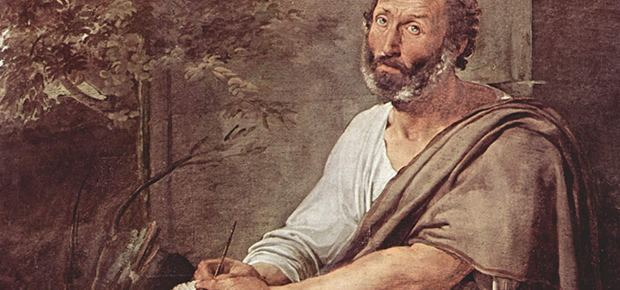
2.3.1 Lucretius
On the life of Lucretius we have very little information and no clue of help can be found in more than 7000 version of De Rerum Nature. A testimony of St. Jerome (IV sec.), to be taken with caution, tells us that in 94 a.C. born poet Titus Lucretius, become crazy for a love potion and committed suicide at the age of 44 age. In War virgiliana the grammarian Donatus, also the fourth century, the birth of Lucretius is placed around the 99/98 a.C.
When Lucretius begins to compose his great philosophical work in verse, the Nature of Things, is aimed at an audience that poetry is expected not only the story of the epic deeds, but even answers about the world and the meaning of existence.
Philosopher Lucretius, as well as poet, reading and studying the works of Epicurus, Another important section of the great archive of the culture of the Greeks, and against the same opinions of the teacher who has no estimate of poetry, turns to the didactic poetry. And so, you auctioneer verse of issues such as lack of interest towards the world of men, the evils of Religion, the physics of atoms that can lead man to liberation from the anxiety of death.
The origins of didactic poetry can be traced back to the greek poet Hesiod, author of the poem The works and days. Unlike epic, of narrative, the didactic poetry meant to convey a teaching mediating between wisdom and creative imagination, between utility and pleasure. The author therefore turns to a real person, which may be real or fictitious, and that is evoked in the text and also asked. In The nature of things, the speaker is the poet Memmius, perhaps the same character to which followed the poet Catullus had gone to Bithynia, and which appears as the protector of cultural Lucretius, at least until, around 52 a.C., he was driven into exile by a corruption trial.
Beyond the recipient Memmius, humanity as a whole is that Lucretius wants to convey his message, traveled through a poem by an anxiety of truth. The content of the teaching that the poet wants is to spread the doctrine of the Athenian philosopher Epicurus (341-270 a.C.), of which Lucretius proclaimed follower, according to which the center of human life, you have to put the pursuit of happiness through the liberation from the fear of death and the light of the knowledge of nature.
The poem opens with ' Hymn to Venus, cosmic force generation of human beings and the figure of pleasure (Pleasure) Epicurean, Venus that instills the desire of life and pushes each species to propagate in the existence, against war and death symbolized by Mars. Then follows the discussion sauces atoms, considered beginnings, that is, the first constitutive elements of matter. To pursue the goal of illuminating complex scientific truths, Lucretius also uses the power of myth, of figurative language that makes use of similes and metaphors that make concrete what is otherwise invisible. The contents of the book of I and II The nature of things tells us that nothing comes from nothing or from the work of the gods, and nothing goes to meet complete destruction, since the atoms are immortal and gives rise to myriad forms of existence through their aggregation. In the third and fourth book there is a discussion of the biological and psychological components of the human organism, and then the proof of the inconsistency of the fear of death, since the latter operates the separation between the body and the vital principle that animates, and nothing will remain of us after this separation. Also, confuse sexual attraction with love, means condemning the prison that binds the satisfaction of their instincts to a particular person.
The last two books of the poem dealing with the birth of the world, considered as an organism like any other living bodies, subjected to a process of growth, decadenza and death, where there is no place for the deities that are designed completely detached from reality and human dwelling in the "inframondi" (intermundia) where they enjoy most perfect stillness. The story focuses on Lucretius path fraught with difficulties and hardships, that the man had to make from nature to culture. The poem ends with the description of natural phenomena scariest (thunder, Lightning, earthquakes, volcanic eruptions), and with that of some lethal diseases, as the memory of the plague of Athens in 430 a.C.




